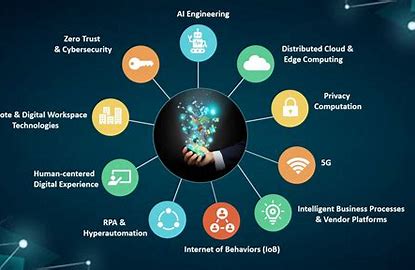Introduction
Technology has become an integral part of our lives, transforming the way we live, work, and interact with the world. From smartphones and artificial intelligence to renewable energy and virtual reality, technological advancements continue to shape our future in remarkable ways. In this article, we will explore ten significant technology trends that are driving innovation and revolutionizing various industries.
Definition of Technology
Before diving into the latest trends, let’s begin with a clear understanding of what technology entails. Technology refers to the application of scientific knowledge and tools to solve practical problems, improve efficiency, and enhance the human experience. It encompasses a broad range of fields, including electronics, software development, engineering, and more.
Advancements in Technology
Artificial Intelligence (AI): AI is revolutionizing industries by enabling machines to perform tasks that traditionally required human intelligence. From virtual assistants and autonomous vehicles to machine learning algorithms, AI is driving automation and improving decision-making processes.
Internet of Things (IoT): IoT refers to the network of interconnected devices embedded with sensors, software, and connectivity, allowing them to exchange data. This technology enables smart homes, cities, and industries, enhancing efficiency, convenience, and sustainability.
Blockchain: Blockchain is a decentralized and transparent digital ledger that records transactions across multiple computers. It provides secure and immutable records, making it useful for various applications, including finance, supply chain management, and voting systems.
Augmented Reality (AR) and Virtual Reality (VR): AR and VR technologies are transforming how we perceive and interact with the world. AR overlays digital information onto the real world, while VR creates immersive virtual environments. These technologies have applications in gaming, education, training, and beyond.
Impact of Technology on Society
Enhanced Connectivity: Technology has connected people globally, enabling instant communication and collaboration. Social media platforms, video conferencing tools, and messaging apps have bridged distances and fostered a sense of community.
Improved Access to Information: The internet has democratized access to information, empowering individuals with knowledge and opportunities. Online learning platforms, digital libraries, and search engines have made education and research accessible to anyone with an internet connection.
Economic Growth and Job Creation: Technological advancements have fueled economic growth and created new job opportunities. Industries such as e-commerce, software development, and renewable energy have thrived, driving innovation and employment.
The Role of Technology in Business
Automation and Efficiency: Businesses are leveraging technology to automate processes, improve efficiency, and reduce costs. Robotics, data analytics, and cloud computing enable streamlined operations and enhanced productivity.
E-commerce and Digital Marketing: Technology has revolutionized the way businesses operate, with e-commerce becoming a dominant force. Digital marketing strategies, such as search engine optimization (SEO) and social media advertising, help companies reach a global audience and drive sales.
Healthcare and Technology
Telemedicine and Remote Monitoring: Technology has transformed healthcare delivery, particularly during the COVID-19 pandemic. Telemedicine allows patients to consult with healthcare professionals remotely, while remote monitoring devices enable continuous health tracking and early intervention.
Education and Technology
Online Learning and Virtual Classrooms: Technology has disrupted the traditional education system, enabling online learning platforms and virtual classrooms. Students can access educational resources from anywhere, fostering lifelong learning and personalized education.
Communication Technology
5G Networks: The advent of 5G networks promises faster internet speeds and lower latency, revolutionizing communication and connectivity. This technology enables seamless video streaming, enhances IoT capabilities, and paves the way for autonomous vehicles.
Entertainment Technology
Streaming Services: Technology has transformed the entertainment industry, with streaming services gaining popularity. Platforms like Netflix and Spotify offer on-demand access to a vast library of movies, TV shows, and music, providing personalized entertainment experiences.
Environmental Technology
Renewable Energy: The development of renewable energy technologies, such as solar and wind power, has contributed to a greener and more sustainable future. These technologies reduce reliance on fossil fuels and mitigate the impact of climate change.
Ethical Considerations in Technology
Data Privacy and Security: As technology becomes more pervasive, concerns about data privacy and security arise. Striking a balance between innovation and protecting personal information is crucial to build trust and ensure responsible technology use.
Conclusion
Technology is propelling humanity into a future filled with endless possibilities. From artificial intelligence and blockchain to augmented reality and renewable energy, the advancements we witness today are shaping the world of tomorrow. Embracing these technology trends responsibly and ethically will be key to unlocking their full potential and creating a brighter future for all.
FAQ
How do these technology trends impact job security?
The emergence of new technologies may disrupt certain job sectors while creating opportunities in others. It’s essential for individuals to adapt and acquire relevant skills to stay competitive in the evolving job market.
What are the potential risks associated with AI?
AI poses challenges such as biases in algorithms, job displacement, and potential threats to privacy. Ethical considerations and regulations are necessary to address these risks and ensure responsible AI development and deployment.
How can technology contribute to sustainability efforts?
Technologies like IoT, renewable energy, and efficient resource management systems play a significant role in promoting sustainability by reducing environmental impact and fostering more eco-friendly practices.
Will technology replace human interaction?
While technology facilitates communication and connectivity, human interaction remains essential. Technology should enhance, not replace, human relationships, and it’s crucial to find a balance between virtual interactions and face-to-face connections.
What does the future hold for technology?
The future of technology is incredibly promising, with advancements in fields like quantum computing, biotechnology, and space exploration. The possibilities are vast, and innovation will continue to shape our lives in unimaginable ways.








